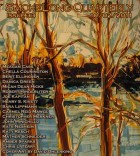One thing that immediately interests me about “Sovetskoye Shampanskoye” is the numerical form, counting from 0 to 9, building key moments and images that create the arch of your main character’s life. What inspired you to structure the story this way?
I wanted the story to feel measured and analytical, since the descriptions are external and focused on the setting and the environment, instead of on bodies and emotions. I tried to imagine what the rooms and places and external environment would tell about scenes from a life, because even when we have a strong emotional response to events, most of our external environment is still and quiet. I wanted to explore that contradiction.
The story is also a look at the recent past, the Cold War. I can vaguely remember news footage from Eastern Europe and Russia, and the fall of the Berlin Wall. As a child I couldn’t understand the motivation behind the Cold War and the actions of the governments and agents that we heard about in the news. The story is a little like going back to that. I imagine that government agents had to be quite analytical and calculating in their work and covert lives behind the Iron Curtain, and the numbers’ structure reflects that too.
As well as writing fiction, you are a science journalist by trade—does this inform your creative writing (or subject interests) much?
It does very often. I keep coming back to the environment, both natural and man-made, and how important it is for our lives and for the quality of life for both humans and animals. Animals and the natural environment tend to appear in some ways in my stories too, but also architecture and other ways to structure the environment.
Science, and especially the natural sciences, has a way of using language and words that I find very interesting. It can be difficult to understand, but it can also sound almost poetic at times. But there are of course aspects of human life and fiction where science is not relevant and where one has to trust the subjective experience and the truth of the moment.
Your debut novel, The Empty City, was published as an ebook over the summer and will be appearing in print soon. Can you tell us a little something about this experience?
The book itself took almost 1.5 years to write and edit, as I was inexperienced and didn’t really know where to start. It took a lot of consideration and pondering and reading to reach the decision, but I ended up not submitting it to an agent or publisher. I only knew about a few publishers that would consider a novel which questions the relationship between the self and the subjective experience, and most of them were non-fiction publishers. I also wanted the project to be partly a charity project for conservation of biological diversity, which is one of my hobby horses (I’m a biologist by education).
There seemed to be a lot of interesting things going on in the ebook market, so I decided to try it out. It was probably not faster or less strenuous than being with a publisher, as I did find it necessary to work with an editor and graphic designer. Also, working without the support from an experienced publisher can be difficult. But I came into contact with other writers that were publishing their own back catalog, published in small writer-owned imprints, or on their own, and it was very useful to hear about their experiences and activities.
It’s been a lot of work, but also very instructive. I enjoy connecting with readers and writers and editors a lot, but I find aggressive advertising or marketing difficult, so I’m trying to find a more soft and open way to do that.
What are you working on now?
I always have one or two short stories bobbing in my head and on the laptop, some of which will be developed and some not. A while back I realized I had several short stories, and I’m working on developing them into a short story collection.



 The core workshop of SmokeLong Fitness is all in writing, so you can take part from anywhere at anytime. We are excited about creating a supportive, consistent and structured environment for flash writers to work on their craft in a community. We are thrilled and proud to say that our workshop participants have won, placed, or been listed in every major flash competition. Community works.
The core workshop of SmokeLong Fitness is all in writing, so you can take part from anywhere at anytime. We are excited about creating a supportive, consistent and structured environment for flash writers to work on their craft in a community. We are thrilled and proud to say that our workshop participants have won, placed, or been listed in every major flash competition. Community works.